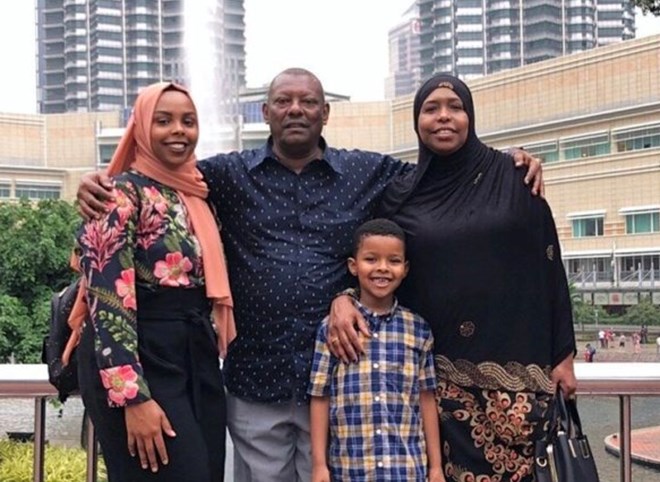
By Rowaida Abdelaziz,
Friday November 20, 2020
Families like the Salems are eager to see if the Biden administration will follow through on promises to help separated families and refugees.

Afnan Salem with her parents and nephew in Kuala Lumpur during a recent visit in July 2019.PHOTO PROVIDED BY AFNAN SALEM
Mohammed Salem Ali, a 64-year-old Muslim refugee from Somalia, has missed out on years with his family. He wasn’t there for the birth of his three grandchildren, and, because of President Donald Trump’s travel ban, he was kept from joining his family in the United States. If he isn’t approved for a visa soon, he could miss his 22-year-old daughter’s college graduation in the spring.
The Salem family hopes that will change under President-elect Joe Biden.
Biden, who will take office in January, has vowed to end Trump’s ban on entrants from certain countries, most of them majority Muslim, including Somalia. The so-called Muslim ban has kept thousands of families apart, simply based on nationality, in a not-so-subtle twist on Trump’s 2015 campaign promise to ban all Muslims from entering the United States. And those families, like the Salems, are anxiously watching to see what Biden and his administration do next.
“The Muslim and African immigrant community will hold them accountable to his pledge. They want to make sure that this is a Day 1 action and the Biden administration repeals all iterations of the ban, including the Muslim ban and African ban, the refugee ban and asylum ban,” said Subha Varadarajan, the legal and outreach fellow for the No Muslim Ban Ever Campaign, a coalition of civil rights organizations dedicated to overturning the travel and immigration restrictions.
Mohammed’s wife, Fadumo, and children, including college student Afnan, came to the U.S. in 2010 as refugees. The Salem family applied for Mohammed to join them in 2013 and again after they became U.S. citizens in 2015. They also applied for Fadumo’s parents, Somali refugees living in Uganda, to come to the United States, and they were scheduled for resettlement in February 2017.
Then came Trump’s travel ban, implemented via executive order in January 2017, which also dramatically slashed refugee admissions.
Fadumo’s parents were immediately blocked from resettling in the U.S. Mohammed continued to move through the visa process and had an interview with a U.S. official in May 2018. During the interview, the officer informed him his visa was denied due to the travel ban, even though he had completed his background checks and the health screenings,Afnan said. The family applied for a waiver that same month but never received a response.
The separation has been heartbreaking, Afnan said.
In 2018, she and other family members traveled to Malaysia, where her father currently resides, to see him for the first time in years. There, he finally met some of his grandchildren. Then they had to go back to the U.S. and leave him behind.
“I wouldn’t wish this on anybody,” Afnan said.
She, her mother, two brothers and her sister all voted for Biden this year, seeing in him their only hope to end the separation from their father for another four years. Afnan said they couldn’t bear it any longer.
“This election was very stressful for me because it meant either it was going to be someone who is willing to remove this travel ban or someone who was going to continue it,” she said.
Biden’s promises won’t all be easy to fulfill. The Democrat pledged to raise the maximum number of refugee admissions to 125,000 a year, but advocates for the immigrant and refugee communities, along with policy experts, say it won’t be easy rebuilding the refugee system after it suffered so many blows from the Trump administration.
The number of admitted refugees has steadily declined under the Trump administration, and 2020 marked a historic low. The U.S. admitted only about 11,000 refugees in 2020 due to border closures during the first few months of the coronavirus pandemic, but even before COVID-19 hit, the number of actual admissions had been well below the caps set under Trump.
And though Biden could repeal the ban with an executive order, policy experts say lawsuits by Republicans could delay a reversal taking effect.
Still, advocates say repealing the ban is an important first step.
“There needs to be a commitment from the Biden administration beyond simply writing an executive order but following through with the agencies that the executive controls to make sure that this xenophobic policy that was put in place by the Trump administration gets undone root to branch,” said Kevin Herrera, a staff attorney at the National Immigration Law Center.
That means making sure that the Department of State expedites the thousands of applications stuck in limbo by the ban and the thousands of denials that came afterward, Varadarajan added.
Afnan, in her last year at Ohio State University, hopes to go to law school and become an immigration lawyer. She hopes her father is able to make it to the U.S. in time to see it.
“When the travel ban went into effect, I was being targeted and being told I didn’t have the right to be with my family because of my faith, or where I come from,” Afnan said.
“Having someone in office that actually respects where you come from and doesn’t target you just because of your faith is what has given me hope.”